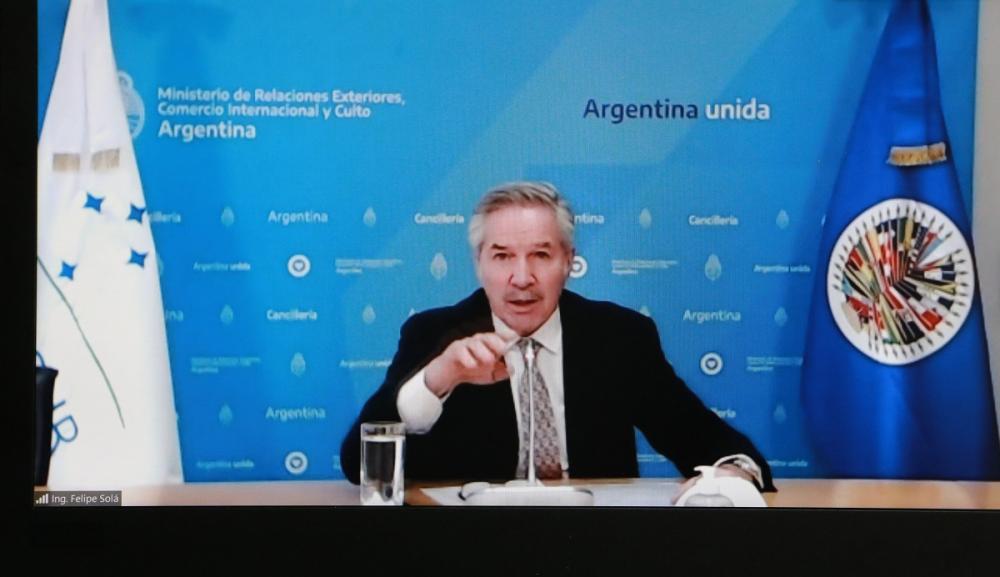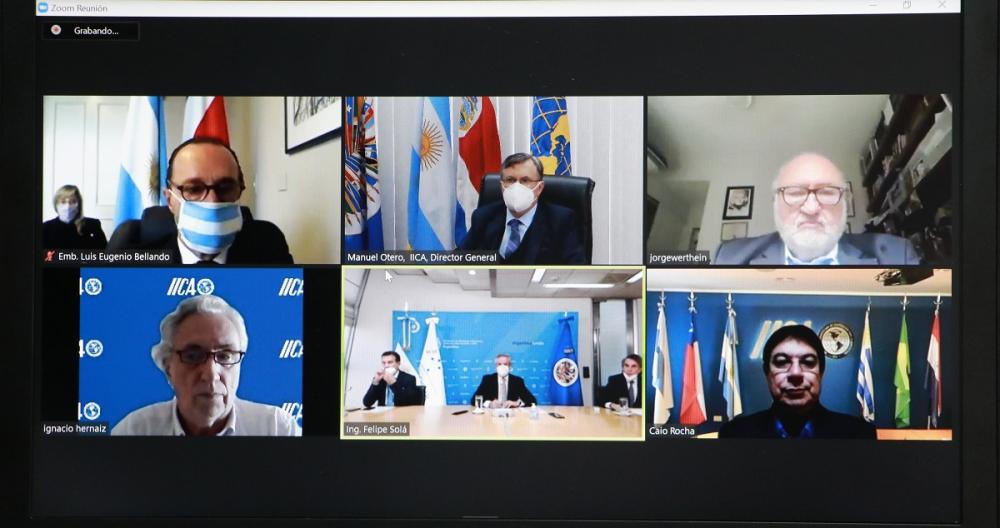Argentina and IICA to enhance technical cooperation with the Caribbean and Central American rural sector

San Jose, 16 April 2021 (IICA). Argentina and the Inter-American Institute for Cooperation on Agriculture (IICA) will increase joint technical assistance to Central American and Caribbean countries in various areas, aimed at developing the agriculture sector’s production capacity and improving rural life.
This was set out in a Memorandum of Understanding signed by Felipe Solá, Minister of Foreign Affairs, International Trade and Worship of the Republic of Argentina, and IICA Director General, Manuel Otero. The agreement establishes a Triangular and South-South Cooperation Program, prioritizing the countries of Central America and the Caribbean.
During the online event, Solá remarked that, “We are very pleased to sign this agreement and are confident that it will be extremely useful, as it will be managed by experienced individuals, with their finger on the pulse of technological change throughout the world”. Furthermore, he said that “life for thousands of millions of people has been changed by the pandemic, among them the farmers who will benefit from these types of cooperation programs”.
The Argentinian minister, who was joined by Guillermo Justo Chaves, the Chief of Staff of the Ministry, and Juan Ignacio Roccatagliata, who was representing the General Directorate of International Cooperation, commented that, “There is a common denominator, which is the need to increase productivity through technology (in operations, inputs or both) and also to increase industrial productivity”. He also stressed the importance of extension services, organization and the significance of technological change to the agriculture sector.
“Agricultural activity in the Caribbean is quite different to what we are accustomed to in countries in the southern region, beyond any political or ideological view that either of us may have. We are living in a time of major changes in agriculture and an era of much debate about the future, in which IICA is taking part”, said Solá.
This new document is the latest stage in a journey that began in April 2009. At that time, Argentina and IICA signed their first Memorandum of Understanding, which established the basis for joint horizontal technical cooperation actions with countries in the Americas to improve agriculture and rural life.
One outcome of that agreement was the API-Caribe project, which strengthened the beekeeping industry and boosted beehive productivity in Barbados, Dominica, Satin Lucia and Saint Kitts and Nevis, through the support of Argentinian beekeeping specialists and product testing and marketing.
“The pandemic has changed our lives and the lives of farmers, while also increasing poverty. Of the world’s 1.4 billion poor people, 1 billion live in rural areas. We know that this situation exists in Central America, the Caribbean and also in parts of South America and Argentina”, said the Foreign Affairs Minister, pointing out that the agreement aims to “address the poverty of the program’s beneficiaries– farmers and those who are seeking food assistance”.
The IICA Director General, Manuel Otero, maintained that the most pressing global challenges today—a growing population, biodiversity loss, the impact of climate change—have cast the spotlight on agriculture.
“We live in a heterogeneous hemisphere”, he said, “in which there are regions such as Central America and the Caribbean that are undergoing severe food insecurity problems, are extremely vulnerable to climate change and that have weaknesses in their rural development strategies”.
Moreover, he said that, “When compared to Argentina and a region, such as Mercosur, which has food surpluses, national science and technology systems, and a public agenda in which agricultural issues are well represented, the differences demonstrate the possibility of building bridges to connect regions with complementarities. These differences may also serve to promote cooperation and access to technology, while paving the way for sustained trade”.
Otero stressed the value of cooperation as a means of strengthening international relations and stated that, in addition to its solidarity dimension, it had the capacity to spur the development of countries, encourage modernization of the private sector, as well as innovation in public management and trade.
“If we have learned one lesson from the pandemic”, he said, “is that tackling the health crisis calls for more cooperation – modern, updated, multidimensional, multi-country and interactive cooperation, in which public and private sector partners collaborate, in order to be effective and create a visible impact”.
Otero also addressed the Saint Vincent and the Grenadines situation, where an eruption of La Soufriere Volcano has threatened food security. “The eruption in our sister country in the Caribbean has led to the forced evacuation of close to 20% of the country’s total population, who live in agricultural and livestock production areas. Undoubtedly, this will have a tangible effect on food security”.
The agreement between the Foreign Affairs Ministry and IICA will aim to facilitate knowledge and experience transfer, focusing on agricultural and rural issues.

The cooperation initiatives will be implemented through specific agreements that the Parties will sign with third countries, involving experts being sent to develop projects and local professionals being trained, with a view to transferring knowledge within their country. Additionally, there will be training activities, research studies and the provision of material and equipment.
The cooperation areas of the Triangular Cooperation Program will fall within the framework of IICA’s five Strategic Pillars: Bioeconomy and Production Development; Territorial Development and Family Farming; International Trade and Regional Integration; Climate Change, Natural Resources and Management of Production Risks; and Agricultural Health, Safety and Food Quality.
Other participants at the signing of the Memorandum of Understanding were representatives from the Ministry of Foreign Affairs – Guillermo Justo Chaves, Chief of Staff, and Juan Ignacio Roccatagliata, head of Multilateral Cooperation (General Directorate of International Cooperation). Also present were Santiago Bonifacio, from the International Relations Division of Argentina’s Ministry of Agriculture, Livestock and Fisheries; Luis Bellando, the Argentinian Ambassador to Costa Rica; and IICA representatives Lloyd Day, Deputy Director General; Beverly Best, Director of External Relations; Jorge Werthein, Special Advisor to the Director General; Caio Rocha, IICA Representative in Argentina and Regional Coordinator for the Southern Region; and Ignacio Hernaiz, Special Advisor on Institutional Relations for Mercosur.
More information:
Institutional Communication Division, IICA.
comunicacion.institucional@iica.int